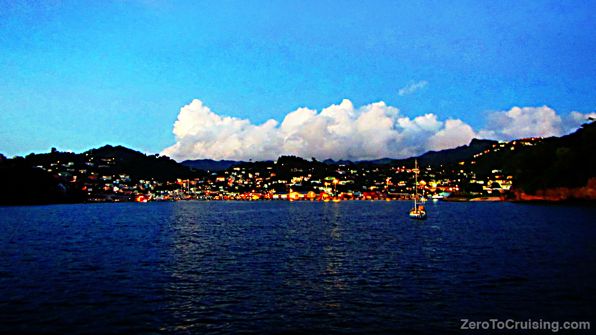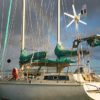What if…
What if…? I happen to think that this is the beginning of the question(s) which keeps good mariners out of trouble. Conversely, I also believe that the failure to ask the important “what if” questions is frequently the root of many nautical problems, if not catastrophes. What do I mean?
Take for example our short trip yesterday along the southern coast of Grenada. We departed Calivigny Harbor at 8:00 AM with Hog Island as a destination. As it frequently does in this area, the wind was blowing out of the southeast which meant that for the majority of the trip we would be on a lee shore. For those not fully up to speed on their nautical terminology, what this means is that the wind and waves were blowing our boat towards the shoreline as opposed to away from it. With our engines operating properly, this isn’t an issue. If we were to have had an engine failure though, it would have allowed Mother Nature to take over and drive our boat onto the nasty reefs and rocks which border the coast, an action that would have almost certainly spelled the end of ZTC. So where does the “what if” thing come into play? Unlike some captains that we see steaming along the shore in water that is surely deep-enough, but a scant distance from the rocks, we actually considered the above scenario. To account for the possibility of an engine failure, we gave ourselves plenty of sea room, staying a considerable distance offshore. This added distance would hopefully have given us the time necessary to raise sails, fix the engine problem or whatever.
That’s a pretty serious scenario, isn’t it? The concept of asking these types of questions shouldn’t be limited to issues like that though. As another example, I had a discussion with a cruiser one time about solar panels, generators, etc. Because he had asked about it, I was explaining that our Honda generator served as a backup for us and we only ran it when our panels were not able to keep up with our electrical usage. Another cruiser was within earshot during this conversation and was quick to share that, because they had installed so many solar panels on their boat, they did not need a generator, basically implying that the Honda was a stupid thing to invest money into. Again, I have to ask the “what if” questions, in this case, what if the sun doesn’t shine, or the solar charger burns out, or whatever? Does it not pay to have a back up available to protect your expensive battery bank? Is that not the prudent thing to do? I think so.
There are a dozen or more times each day that we go through this process of asking ourselves:
- What if this happens?
- What will be the result?
- What, if anything, will we be able to do about it?
In some cases the questions are super serious as in the first example and other times, significantly less so. Perhaps the habit of asking these questions is only acquired after one has had their share of problems?

The evening lights of scenic St. George’s harbor, Grenada.



The what if question……..I always ask that question! For me the best example is when going into an inlet or harbor…”What if I lose one engine”? “What if I lose both engines”? This is the ingredient that most boaters don’t put into the recipe and sometimes that recipe can be disaster… Great point!!!
Some boaters don’t have a “recipe” at all. They instead just leave everything to chance.
Some boaters ask that question so much that they never leave the dock. Truth is, there is a fine line between being careful and too careful. Never hurts to have a back up plan though.
I agree, and I had thought about writing that into the post but obviously I didn’t get around to it. 🙂
The point is to not let “potential” problems paralyze you but rather, as you suggest, to have a backup plan in the event that something does go wrong.
It’s the prudent thing to ask.
🙂
Mike I like the way you think, How about instead of sailing for dummies , You put together (What if ) a guide for first time cruisers. Sally and I have followed you from day one along with The Slap Dash and Wind Taveler. Good reading and yes you guys have saved us a lot of ( $ what if $)
That book is in the works!
I prefer to think of that conversion, when conducted between you and Rebecca, as a positive and productive exercise of preparation in case something did happen. I also prefer to think of that conversion, when conducted with just about anybody other than Rebecca, as futile, head banging frustration.
Laurie knows that the first thing she does if we lose both engines close to shore is to deploy around 100ft of anchor depending and quickly secure it. That will hopefully gain us some time to troubleshoot the engines, or deploy the dinghy and use it as a towboat. BTW another reason to have a 15HP instead of 4HP motor on it, but that is another argument… 😉
I seldom share opinions (outside of this blog of course) unless asked. There are others however who have no such reservations about telling everyone within earshot about what they “know” is the correct way to do things.
Always a fun game!
Engine failure (like, I’ve had every variation on that, including double failures between jettys): You have 2. You have and anchor; it should be ready to go down FAST (that’s saved my bacon several times). You have sails (genoa goes up FAST). You plan for sea room.
Solar charger failure: Don’t really need the regulator, in a bind. They can go straight to the batteries if you watch them and just wire in a switch for when they are full. Since they are 12 volt nominal panels (something like 19v open circuit), you can always jump out any bad panels. Not that I have anything against the Honda; I would have one if I were full-time.
GPS failure: I’ve met folks that canceled trips because of this. Since I learned to sail before GPS I find that confusing. Just navigate with charts and your sences.
Power failure, battery failure, and engines won’t start: They should pull-start, but ether helps. There are no essential electrical systems, and most will operate once the engines start.
You have run aground, in spite of the above planing: The dingy should be ready to run an anchor and line out NOW, before the boat pounds or the tide drops. I keep a Fortress with line in the stern lockers.
… and so it goes, on and on. But you can’t stay at the dock or on the beaten track. That’s not life. So your going to get to figure a few of these out when they happen. And that can be rewarding too, when they are neither wallet nor life threatening. No one can really enjoy cruising that doesn’t see it that way.
Yup!
When motoring we always have the halyard attached to the mainsail. Makes it quick to get up and with most modern day cats the mainsail is the sail that will give you the most drive and ability to point. We also have the anchor ready to let loose at anytime.
I will admit that we do not always have the mainsail rigged when we’re only going a very short distance. We do have the anchor ready to drop when anywhere near shore though and of course our headsail can be unfurled in a few seconds.
“A sailboat is a fickle mistress. You’ve got to buy her things. You’ve got to understand everything about her. What you don’t know she’ll use against you.” -Captain Larry
“Murphy lives on a boat… my boat.” -Captain Larry
Well said.
Dave and I were just “playing this game” the other day, and running through the various scenarios of “what if’s”… certainly helps the thought process if/when something goes wrong… it’s something we realize should become part of our morning routine, like coffee 🙂
It’s just something we do all the time.
That is how I think too. Been on the water my whole life and so far have made it back on my own boat. But lots of times I have activated my safety plan. Always with much angst and haste, sometimes in a mild panic. but always had a safety plan of some type in mind, preferably a plan B as well.
I do think that where we generallly err is – we don’t fully discuss our mental safety and back up plans with passengers and crew. That I think would put everyone on the same page quicker instead of say the Captain leaving the rudder to go toss the anchor and yelling like a lunatic about lee shores while everyone else just stares in wonderment with martinis in hand. Been there.
Finally, there are times and places you just have to take calculated risks knowing you minimized them and your equipment is good … you are aware but you go anyway. Staying home would be largely risk free. Boats must go out. Besides, its not the risks we are worrying about that are most dangerous, its the ones we didn’t expect.
I think this way. I do like reading about other sailors’ mental process.
Good thoughts. I think Rebecca and I make a good team because much of what we do does not need to be discussed between us, we just know what to do.
Great topic, Mike!
It’s good to hear people thinking ahead like that and understanding the reality of life and circumstances that we sometimes have no control over. And any “control” we might think we have is often only perceived control.
I’m a police officer and in my job I constantly have to play “what if” scenarios in my head. Sometimes my life can depend on that. My wife thinks I’m paranoid [and others probably do to], but I hope to transition that “what if” thinking to our cruising life after I retire.
Better to be over-prepared than not prepared at all!
Peace,
Mike
I agree!